From body to mind, secure relationships make you feel right at home. A study described feeling secure in a relationship as “a perceived sense of safety, trust, and stability in the relationship where expectations are met or will be met adequately within the boundaries of the intimate relationship.”
It’s also when The Pretenders sang, “Nothing you confess, could make me love you less, I’ll stand by you.” Or when India.Arie Simpson sang, “We can talk about anything, he’s got nothing to hide. He’s not afraid of his feelings, he’s not a slave to his pride. He’s givin’ me love, so steady.” Or when Michael Franti & Spearhead sang, “I’m not afraid to be alone. But being alone is better with you. Life is better with you.”
Lyrics apart, for professional insights on signs of a secure relationship, we spoke to Niyatii N Shah, a sexuality educator, counselor, intimacy coach, and parenting coach. Let’s get to the bottom of secure relationship meaning and find out how two people can create healthy romantic relationships that are fit to be made into songs.
What Is A Secure Relationship?
Table of Contents
Niyatii says, “It’s the sense of being able to rely on your partner emotionally, physically, and financially.” Basically, it’s when your intrinsic alarm feels mostly rested. But let’s befriend the feeling of insecurity before we talk about secure relationships. According to this research, “What’s the opposite of insecurity? Total confidence? Complete fearlessness? At first, that sounds amazing. But be careful what you wish for. Only 1 percent of the population has achieved this dubious goal – psychopaths.”
If you’re not a psychopath, then let’s try to remember that insecurity helps our primitive brain with safety, self-awareness, belonging, and harmony. Per the above study, from nature’s perspective, it’s better to ring a false alarm when there is no threat than to miss a real threat. Hence, insecurities between partners can also act as an alarm system for them to seek safety and harmony with each other.
One great way to understand secure relationship style is to contrast it with the characteristics of unsafe relationships. A few or even one of these traits could recur and harm a secure relationship:
- There are unpredictable behavior/mood swings, unresolved conflicts, or hidden anger toward one another in an unhealthy relationship
- If there’s no trust between partners, a lack of open communication, or if you still need to perform in front of each other, that’s not a secure relationship style
- One partner’s inappropriate behavior or substance abuse
- Your emotions are not heard, validated, or reciprocated. You feel judged
- Lack of physical safety, emotional safety, or financial safety, or being overburdened with emotional or financial labor
- Fearing big topics and conflicts/disagreements and being unsure of whether your partner will stay in your life or break your heart
- Feeling like your needs don’t matter, feeling like a burden, unable to express individuality, and unable to set boundaries with partner
- Resentment for your partner’s free time, success, friendships, social support system, looks, fitness, etc.
Niyatii says, “Couples, even in adult relationships, often assume that their partner knows what they need or want without expressing it, not actively listening to their partner, using passive-aggressive language, avoiding difficult conversations, and not being open and honest about their thoughts and feelings with one another.” Keeping that in mind, here are two examples that illustrate the secure relationship meaning:
- “When I ask for affection or some quality time, I know that my need is valid and reasonable, and that I will receive the reassurance I deserve”
- “They have photos of their friends on their social media, but not with me. I know they love me, so let me first ask them if they would be okay with displaying their long-term relationship with me on social media”
Related Reading: Transparency In Relationships: Meaning, How To Show & Some Secret Tips
What Does A Secure Relationship Look Like?
According to Gottman Institute, “We have an imperative for safety deeply wired into our minds and bodies … Some people get turned off by the idea of prioritizing safety in their relationship because they equate a “safe” relationship with a “boring” one, but it turns out that the secure relationship we all long for is cultivated best when we feel safe.
Feeling secure in a relationship is a prerequisite for being in a relationship. This security isn’t about having and holding a safe space consistently, but to have the intent and capacity to build it even during hurt and ruptures, and to have the comforting knowledge that you’ll “come back to your partner” no matter what.
In a Reddit thread, a user says that in an emotionally secure relationship, “1) You both share the same core values. If one of you is supportive of LGBTQ+ and the other hates them, you will never be able to be authentic. Not having the same political, religious, economic, moral views won’t work out well. 2) You cultivate honesty by accepting the normal differences in others and have the right manners to address these. If your partner hates your fav movie, that’s okay. Discuss it without getting mad at them.”
Other Reddit users on that thread described their experiences of having a secure attachment style in the following ways:
- Having a life outside the relationship
- Feeling like your emotions are valid even if you happen to be in an argument
- Not freaking out if they haven’t spoken to you in a while because they’ve reassured you that they’re busy doing something
- Knowing it’s possible to mess up some things, even in a healthy relationship
5 Characteristics Of A Secure Relationship
People with anxious and avoidant attachment styles are either scared of losing their partner or are sure that they will be abandoned, respectively. This creates intense worry and insecurity in their relationships. If you resonate with this, you don’t have to feel anxious about how to have a secure relationship. Because no matter your current attachment style, it’s possible to work toward a healthy attachment with your partner and nurture a secure bond in other relationships of your life too.
Now let’s talk about the 5 characteristics of a secure relationship that you should aim for:
1. “This is who I am” – You can unmask in a secure relationship
You have a reliable dynamic with each other if conversations turning into arguments is not a norm, and you’re able to do the following:
- You’re able to talk about the heavy, dark, and confusing stuff
- If you’re autistic, you’re able to unmask in front of your partner. You can stim, you can be who you are, and not hold yourself to neurotypical standards
- Regardless of neurotype, you don’t feel alone with your tough-to-manage emotions in a secure relationship
- You can be open about your sexuality and body, and not worry about impressing them
- If you two ever have bad or disappointing sex, you can laugh with each other about it later
- You can fight about the things that matter to you and know that they’ll hear you out
- There’s no baggage from your past relationships or you’re well on your way to heal from them
- You don’t doubt each other’s experiences and trust what the other is saying
Related Reading: Embracing Emotional Vulnerability: Encouraging Men To Express Their Feelings
2. “This is who I want to be” – You feel free to explore your individuality in a secure bond
Niyatii says, “It’s about feeling physically safe with your partner, whether it’s in terms of personal safety or sexual safety. You feel like you can be vulnerable with your partner without worrying about your safety. This can be especially important for survivors of any past trauma or child sexual abuse, who may have difficulty feeling safe around others.”
Partners also encourage each other in the following ways:
- They support each other’s dreams and hobbies
- They are each other’s fan and cheerleader
- They check in with each other sometimes regarding relationship quality, matters of consent, conflict resolution, etc. because they know that a person’s individuality and beliefs can evolve
- They might be surprised with the changes they see in the other, but they ultimately evolve together
- They have seen their partner through many transformations and stages of life, and they are ready for more
- Partner A would help partner B recognize the latter’s discomfort and gently guide the expression of it
- There’s space in the relationship to express yourself the way you are, and also the way you want to be in the future
3. “This is where I don’t agree with you” – Your partner loves you through the agreements and disagreements
You don’t have to be on the same page as your loved one. You should be able to give feedback to one another without the fear of losing them. We swallow our words of discontent, difference of opinion, anger, constructive criticism, core needs and boundaries that are not being met, and relationship concerns when we think our partner will behave in the following ways:
- They will leave you
- They will shut you down, sometimes by yelling and screaming
- They will shut down themselves and it’s tiring for you to melt their defense with pleas, apologies, and reassurances
- They will make you feel bad about having a need or opinion
- They will look down upon your opinion or discard it
- They will laugh at you
4. “This is what I need” – You state your core emotional needs confidently
You’re able to ask for your emotional needs in a healthy way. You don’t choose to be passive-aggressive or sarcastic in order to be heard. In a secure relationship, you’re confident that your partner cares for what’s important to you. An example: “I know you feel sleepy after sex but I feel abandoned when I’m suddenly left alone after such an intense and vulnerable experience. Could you please cuddle with me for a few minutes, kiss my forehead or cheek, and let me know you love me after sex? It’ll help me feel regulated and loved.”
Related Reading: What To Do If You Are Feeling Disconnected From Your Partner?
5. “This is what I would happily do for you” – You both believe in reciprocation of efforts
According to Niyatii, in an equal and healthy bond, both partners rely on each other to initiate and take care of things like:
- Making big and small plans – meeting the family or going out on a date, etc.
- Making financial decisions
- Initiating sex
- Pulling their emotional weight in the relationship
You also state your limitations, boundaries, and deal-breakers, and expect your other half to do the same. Like this:
- “I’m ready to talk to you and listen to you, but I won’t be able to indulge in a conversation around my past relationships”
- “I need some space for myself now, I’ll text you tomorrow morning”
- There’s a reason I left them in the past”
- “I’m not comfortable with video calls this soon in the relationship, let’s wait till we’re both on the same comfort level with each other?”
- “I can’t meet you in loud spaces as it dysregulates me. Let’s meet somewhere quiet instead?”
How To Work Toward Having A Secure Relationship
Niyatii talks about how to create a safe relationship with your partner, “Being able to express your feelings, needs, and desires in a non-judgmental environment makes one feel safe.” She adds that trust is also a pillar of a romantic relationship and is built over time through honesty, reliability, and consistency.
“Also, respect for each other’s boundaries, beliefs, and opinions is essential to make your partner feel safe. Don’t try to change your partner, instead, empathize with them,” she adds. Here is a list of actions that we recommend to foster a secure attachment style:
1. Validate your partner’s experiences, especially the ones you can’t relate to
This includes experiences of discrimination and bias. Nothing has made me feel safer than dating people who have validated my experiences of street sexual harassment and sexual abuse, who have perceived me to be the nonbinary and bisexual person that I am. Being seen is equivalent to feeling safe. It’s healing to see your experiences validated and makes for a secure relationship.
Similarly, if you’re a guy who has been relentlessly taught to ‘man up’, nothing would make you feel safer than when you open up in front of your partner. About your fears, your repressed desires, longing for intimacy and affection, and about past relationships that were toxic or abusive toward you. Niyatii says, “Being vulnerable and honest about your thoughts and feelings, even if they may be difficult to express, and creating a deep emotional connection with your partner – all of these are signs of a secure relationship.”
2. You WILL fight — accept that, and learn how to fight
Fighting fairly and nicely while feeling safe in a relationship – I wish I was taught this at school. I’m not talking about differences where someone’s human rights are concerned. If you need to fight about transgender rights or pro-choice movement, for example, then you may not be best suited for each other anyway.
But when you’re fighting over things that make you think/yell, “UGH! Why do you always do this?”, note how the conflict makes you feel unsafe. During that friction, here are the things to keep in mind:
- Don’t take everything personally
- Breathe through it all and keep some water handy (not to throw at your partner)
- Keep stimming if you need to, it’ll help regulate your nervous system
- If you need to fix a pattern of behavior, apologize but also show yourself grace
- If you need to give them feedback, be gentle
- Stay willing to learn about your partner, don’t think you know them completely just because you’ve been together for a decade
- Don’t speak over your partner’s lived experiences
- Don’t walk away abruptly or shut down when they are trying to speak to you
- Take space and time to collect yourself, but inform them too. Don’t just “peace out” from an argument
- Remember that you love each other even when you’re not seeing eye to eye
- Remind yourself that this isn’t a battle of ‘who is right,’ but of how to achieve more intimacy by dissolving this difference
Related Reading: 8 Ways To Reconnect After A Big Fight
3. Keep that phone away and practice active listening
Your partner needs you to be a safe space for discussing anything under the sun. This requires you to assure them that you’re 100% present with them.
According to Niyatii, “Active listening means giving your partner your full attention and seeking to understand their perspective. When you actively listen, you can validate your partner’s feelings and needs, which can help them feel more secure in the relationship. You can start by making a habit of asking open-ended questions, summarizing your partner’s point of view, and avoiding interrupting them.”
4. Be a rock or a wall or solid ground or a cushion
Or whatever you fancy, really. A rock for their storms, a wall for them to lean on, a solid ground for them to land on, a cushion to soften the blow. Nothing sends calming signals to a person’s mind when they know they have someone at home or in the world who will back them up. People in a stable relationship and with a supportive family usually do better in terms of career and health. It’s all about having a safety blanket.
- Show consistency in behavior, actions, and your presence
- Whether you’re in a monogamous or polyamorous setup, be someone who’s always honest with your partner
- Reassure your partner of their value in the world and in your life
- Be the person they can call a safe space in the best and the worst times
Research agrees. “Positive social support of high quality can enhance resilience to stress, help protect against developing trauma-related psychopathology, decrease the functional consequences of trauma-induced disorders, such as posttraumatic stress disorder (PTSD), and reduce medical morbidity and mortality.”
5. Don’t miss their bids for intimacy
According to research, “Bids are defined as any attempt a partner makes, verbally or nonverbally, to connect with the other partner.” What makes for a happy and secure relationship is “the couple’s ability to pay attention to and effectively respond to these immediate needs for connection.”
Here are three examples. How you respond to these bids would contribute to emotional safety in your relationship:
- Your partner mentioned a small accomplishment that you know means a lot to them: “I was able to set a boundary with my colleague today.” Did you respond with delight and pride? Did you dismiss it? Or did or say, “That’s nice,” and moved on to another topic?
- Your partner mentioned their session with their family therapist, and how relaxed they feel after it. You knew they were facing a tough time. Did you ask them more about their session with interest and care?
- Your partner moves toward you after sex or after conflict resolution, and gently places their hand on your face. Do you move the other way or do you reciprocate?
6. Tell them you’re so lucky and grateful to have them in your life
Don’t take your partner’s kindness, expressions of love, sacrifices, positive traits, presence, and daily labor of household or career management for granted. Our expert says, “Gratitude is powerful. Make a habit of expressing appreciation for your partner through your love languages. Try to be specific about what you’re grateful for, such as their sense of humor or their support through a trying time.”
Singer-songwriter Christina Aguilera had a physically and emotionally abusive father. She said that she felt unsafe throughout her childhood and that her “whole life has been about fight or flight”. She expressed gratitude to her then-husband, saying that her emotionally secure relationship with Jordan Bratman helped her finally break the cycle of abuse that she’d been stuck in since she was a child.
7. Nothing beats quality time as a way to create a secure relationship
If you see each other infrequently or live in different cities, then regular calls or texts or voice clips, and sending photos of your life or yourself will help both of you to feel safe in the relationship.
Niyatii talks about how to have a secure relationship for those who meet often, “Make a habit of setting aside time each week to do something fun or meaningful together, whether it’s going for a walk, cooking a meal, painting, doing crafts, reading books, or watching a movie. Make sure to avoid distractions such as phones or TV and focus on enjoying each other’s company.”
Related Reading: 40 Cute Things To Do With Your Girlfriend At Home
8. Let go of small differences without holding grudges
A secure person has the ability to understand that they and their partner will always differ on certain habits, traits, and opinions. This ability can prove to be a miracle for your romantic relationship. Try to understand if what you’re witnessing in your partner is: i) a small difference, ii) a mistake, iii) a pattern of hurtful behavior.
If it’s the former, let go as soon as you can. If it’s the latter two, gentle and firm conversations and boundary setting will be required after which if you reach conflict resolution, you must … let go. On the flip side, Niyatii warns, “People may take their partner’s forgiveness for granted, without acknowledging their mistakes and actively working towards reconciliation. They do not feel the need to say sorry.”
9. Hold hands, be cheesy
From my own experience of present and past relationships, nothing increases intimacy than holding hands with a queer partner when we’re walking down a road full of cishets. This little act can be cheesy as well as ridiculously brave, and helps us feel secure in an otherwise scary world.
Niyatii says, “Holding hands is a simple gesture that can help couples feel more connected and secure in their relationship. Try to hold hands when you’re walking together, watching TV, or just sitting next to each other.”

10. Tell them you love them – You have to use those three words
“But they know I love them, I don’t need to say it,” say many people from our parents’ generation about their spouses. We now know that those were repressed times, and not something to aspire to. Our expert says, “It is a powerful way to increase intimacy in a relationship. Make a healthy habit of saying “I love you” every day, whether it’s in person, over the phone, or through cute text messages.”
11. Make a routine of intimacy to feel safer with your partner
She says, “List the things you will do every day. Like, hug for three minutes, kiss each other, ask “How was your day? Make eye contact with them when they are talking.” And then ‘listen’ and respond to their answer. Anchor yourself in such small but meaningful actions. You can also surprise each other regularly with little notes of love or tiny gifts on the side table for them to see when they wake up, or in the laptop bag for them to smile when they reach work.
Related Reading: How to Fall In Love Again – This Time In The Small Things Of Life
12. Deliberately focus on each other’s positives
Niyatii says, “Compliment each other as much as you can, in person as well as in public.” Maintain a private diary or a digital note and keep adding to this ever-growing list of positive qualities of your favorite secure person.
Per this study, “Individuals were happier in their relationships when they idealized their partners and their partners idealized them. Taken together, these results suggest that a certain degree of idealization or illusion may be a critical feature of satisfying dating and even marital relationships.
13. Buy or create gifts to feel safety in your relationship
We’re not talking about love bombing the other person or buying them expensive gifts. Here are some things you can give to your partner to make them feel secure about your love:
- A meaningful object that holds a memory for both of you
- A handmade card
- A meal/food item, cooked or ordered
- A poem you wrote for them or a song you recorded for them on your phone
- Fruits and veggies – basically, get them practical items that you know they need
- A sketch/drawing/painting of them, of you two together, of something they love, of a fictional character they resonate with, of their parents, their pet, etc.
- A single flower
- A special experience that you create with and for them
14. Be realistic and talk about money
“A universal way of proving your love to your partner is by securing their future financially,” says Faisa Stafford, President & CEO of Life Happens. “In fact, 59% of people would feel more secure in their relationship if they discussed getting life insurance.”
A poll found that 39% of respondents believe saving money is the top way they show their love to their partner and 67% agree that there’s nothing sexier than saving money. Over 35% said purchasing a life insurance policy or making end-of-life plans is a way of showing love.
Niyatii adds, “Financial conflicts can lead to feelings of inadequacy or shame, especially in men as they are unfairly expected to provide for the entire family. This can create a power imbalance in the relationship, leading to feelings of frustration and helplessness. Ultimately, the lack of financial security can strain the emotional connection between partners and damage their mental health.”
Key Pointers
- A secure relationship is the bond you share with your loved one where you don’t feel threatened in a physical, sexual, emotional, and financial way
- You’re able to express yourself freely and not feel judged or invalidated
- You both know how to fight fair and in a healthy why
- A relationship could become insecure or unsafe when there’s abuse, lies, mistrust, resentment, needing to perform or impress, a lack of love, etc.
- To create a secure relationship, you need to listen to each other, validate the other’s unique point of view and struggle, express love and gratitude regularly, and focus on each other’s positives
Such building blocks and signs of a secure relationship are helpful in making us feel at home in our body and mind, and in making our inner child feel safe who may not have had such experiences with their primary caregivers.
Body Language Of Unhappy Married Couples — 13 Cues Your Marriage Is Not Working
Your contribution does not constitute a charitable donation. It will allow Bonobology to continue bringing you new and up-to-date information in our pursuit of helping anyone in the world to learn how to do anything.





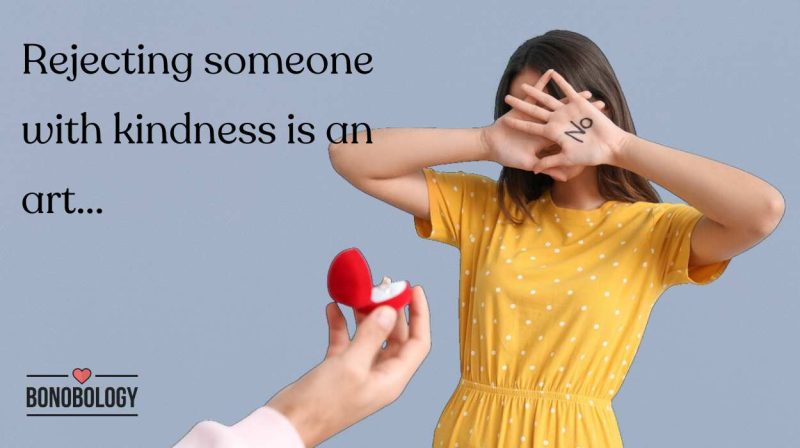
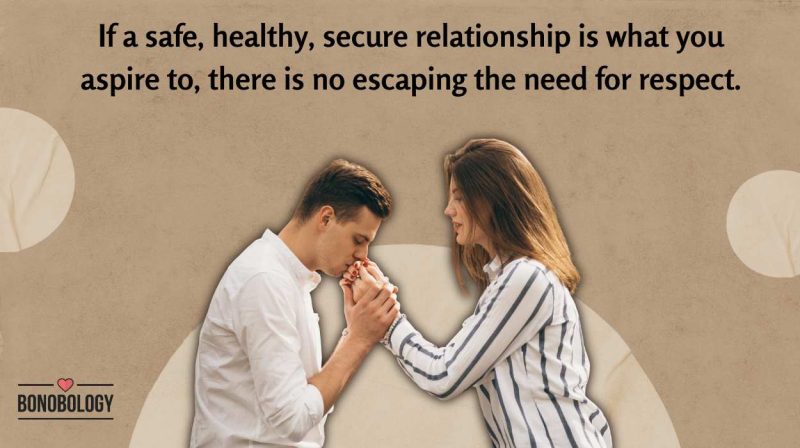

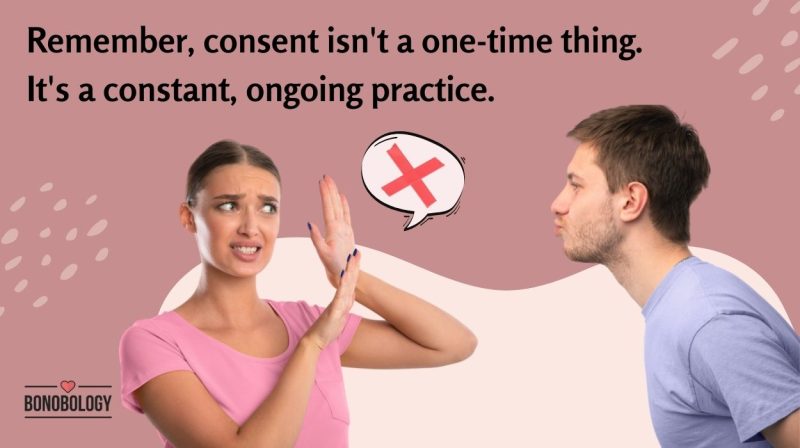

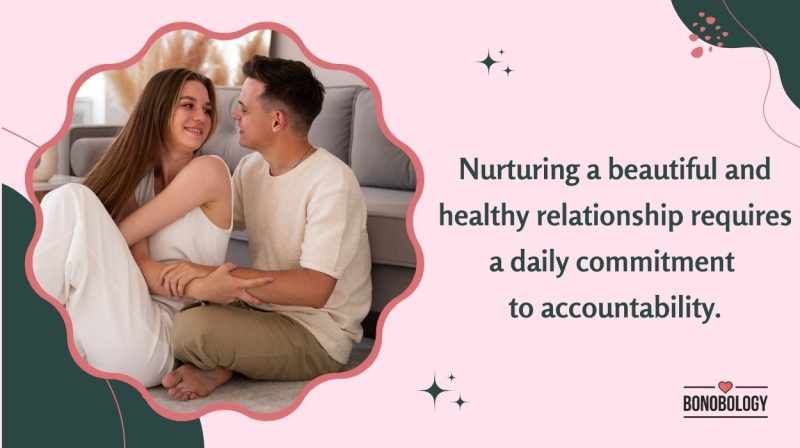
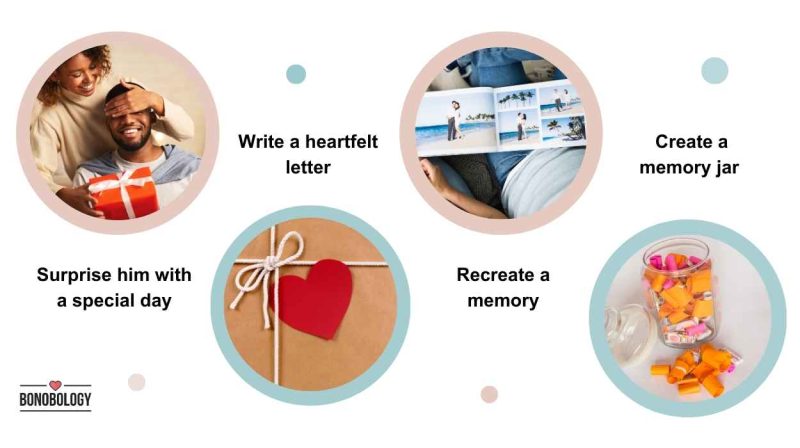
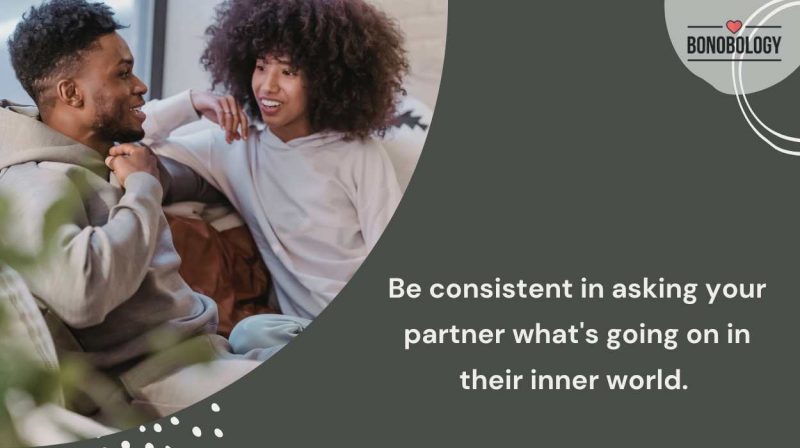
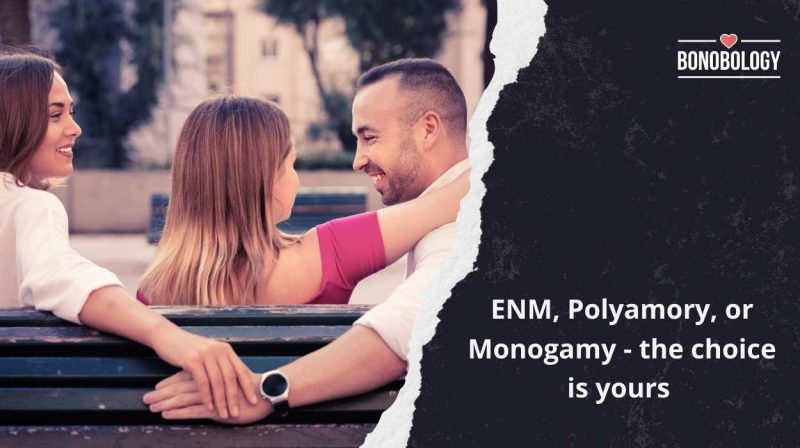
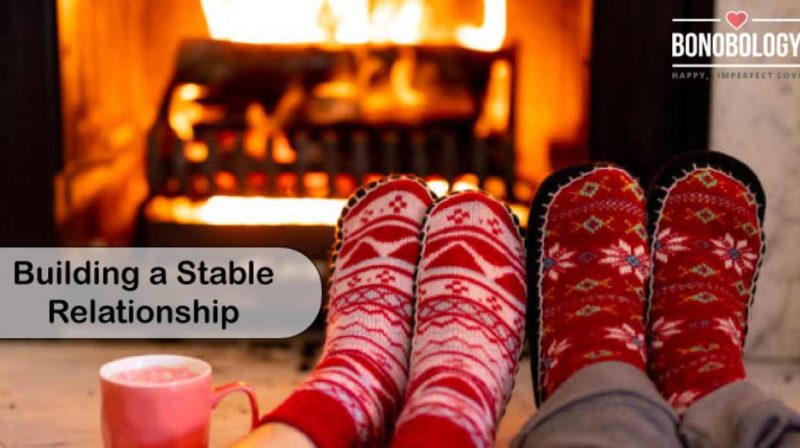

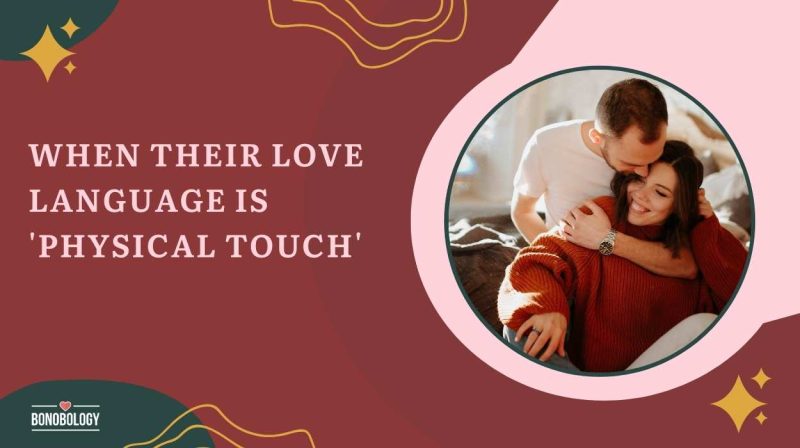
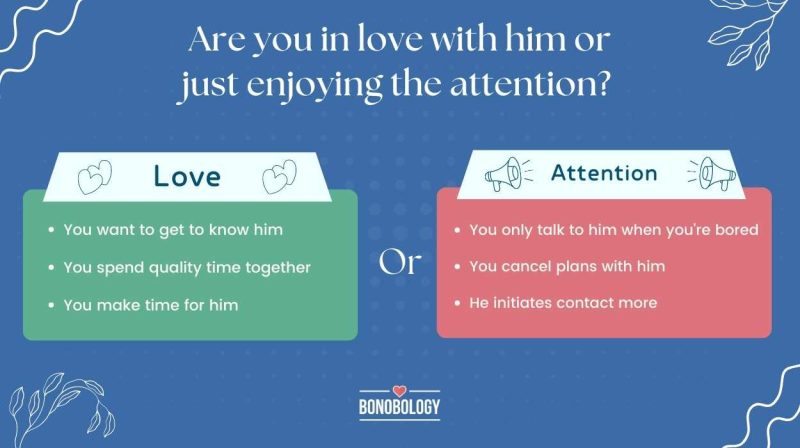
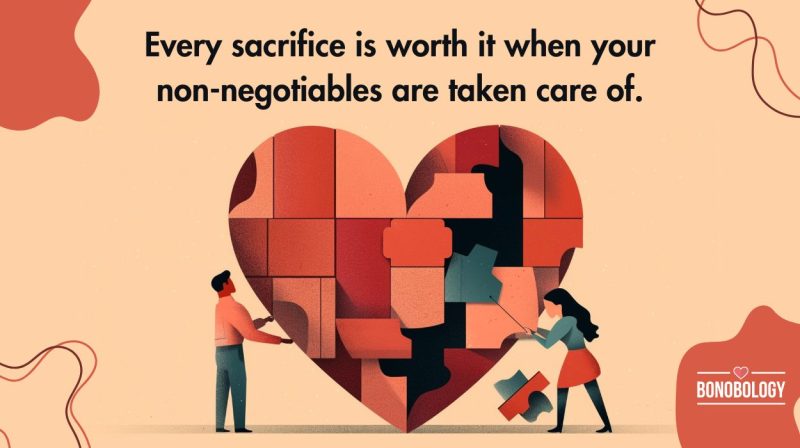
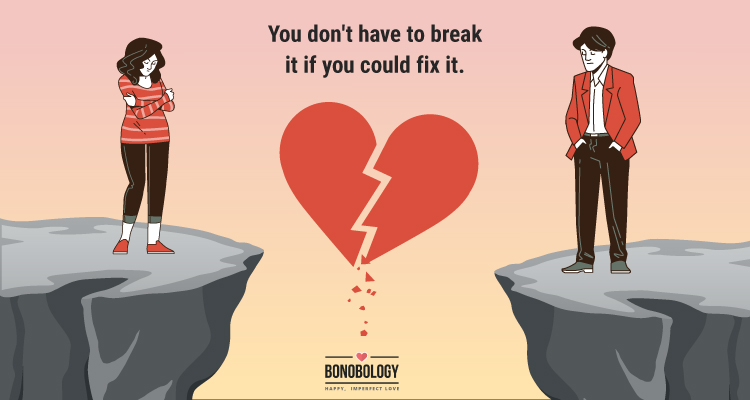
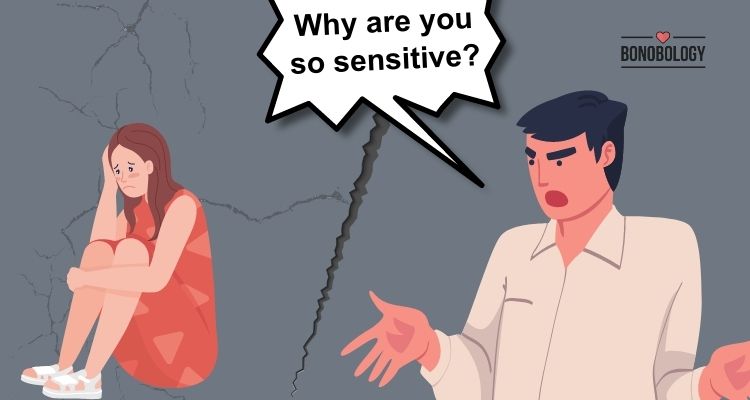


Featured
6 Tips for Helping Your Partner Quit Smoking in Their 50s
How He Treats You Is How He Feels About You — Is It True?
How To Let Someone Down Easy With Kindness And Grace — 13 Tips
How To Show Respect In A Relationship — 9 Ways
The Pitfalls Of Nice Guy Syndrome: How It Affects Relationships
Navigating The Complexities Of Consent In Modern Relationships
11 Ways To Deal With A Sexually Demanding Husband
Accountability In Relationships – Meaning, Importance, And Ways To Practice
How To Apologize To Your Boyfriend: 15 Ways
10 Thought-Provoking Relationship Check-In Questions for Deeper Connection
Is A Monogamous Relationship Right For You? 11 Questions To Help You Find Out
10 Signs You Are In A Truly Stable Relationship (Even If You Feel Otherwise)
7 Subtle Signs Your Partner is Quiet Quitting Your Relationship
Physical Touch Love Language: What It Means With Examples
Do I Like Him Or The Attention? Ways To Find Out The Truth
17 Non-Negotiables In Relationships You Must Never Compromise On
15 Ways To Solve Relationship Problems Without Breaking Up
9 Common Narcissist Gaslighting Examples We Hope You Never Hear
The Most Important 7 Qualities Of A Healthy Relationship
15 Early Signs He Is A Player And Isn’t Serious About You